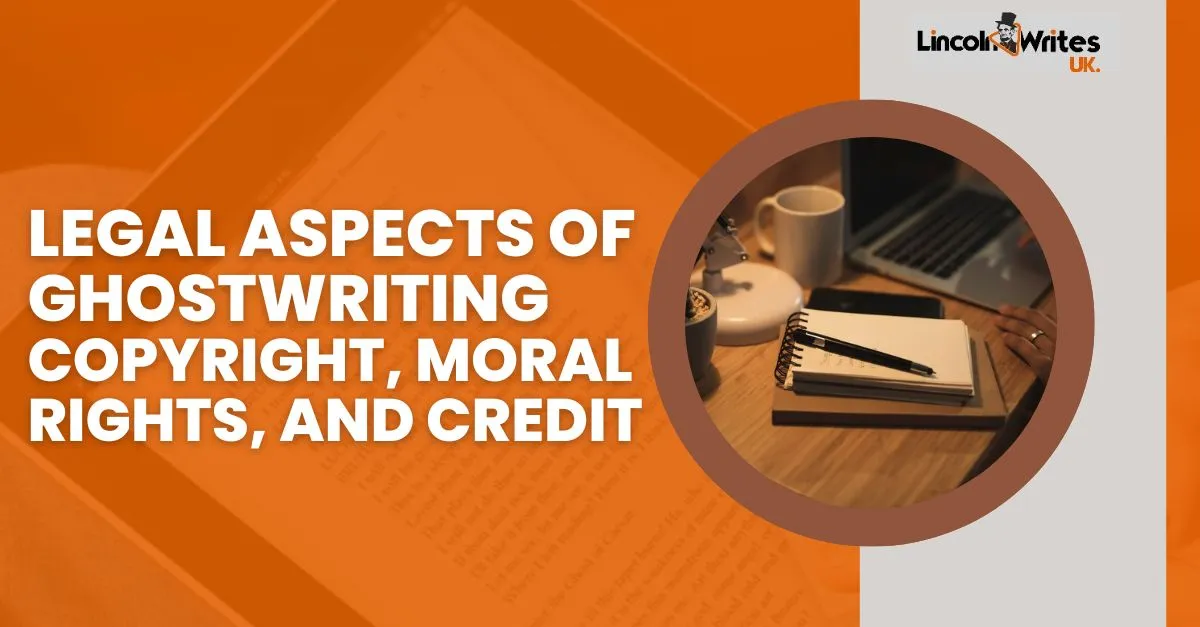Ghostwriting is built on a powerful foundation: trust. Whether you’re working on a sharp-edged business book, a personal legacy project, or content under serious time pressure, legal clarity is essential. From copyright ownership to credit attribution, there’s a lot to unpack, especially if you want to protect both your work and your professional relationship.
In this post, we’ll cover the key ghostwriting legal aspects every author and ghostwriter should understand before getting started. We’ll walk you through the essentials of drafting fair contracts, respecting creative rights, and avoiding legal disputes down the line.
Whether you’re planning memoir ghostwriting or launching a brand-led book under business leader ghostwriting, this is one chapter you can’t afford to skip.
Why Legal Clarity Matters in Ghostwriting
Here’s the deal: ghostwriting is unique because one person does the writing, while another takes the credit. That’s perfectly legal, but only when both parties agree on the terms from the start.
Without a proper agreement, things can get messy:
- Who owns the content?
- Can the ghostwriter claim authorship later?
- What happens if one party breaks the agreement?
When time is short (as it often is with ghostwriter tight deadlines), skipping the legal groundwork can lead to confusion, or worse, a project collapse.
Copyright: Who Owns the Final Product?
Let’s start with the big one: copyright.
By default, under UK law, the person who creates the original content owns the copyright. So, unless otherwise stated, the ghostwriter is the legal copyright holder, even if they’re writing based on your ideas.
That’s why professional ghostwriting services always use contracts to transfer copyright to the author. These contracts should state that:
- The author owns all rights to the final product
- The ghostwriter gives up any claim to authorship or future royalties (unless agreed otherwise)
- The author can edit, distribute, and publish the content freely
This is what ensures ghostwriter ROI belongs to the client, not the ghost.
Moral Rights: The Right to Be Recognised
Moral rights refer to an author’s right to be identified as the creator of a work, and to object if the work is altered in a way that damages their reputation.
In ghostwriting, these rights are typically waived. A well-drafted contract will include a moral rights waiver, which means:
- The ghostwriter agrees not to be credited
- The client can make changes without consulting the ghost
- The ghostwriter can’t publicly claim authorship
For instance, if you’re self-publishing your book across ebook distribution channels in the UK, you don’t want a hidden clause allowing the ghostwriter to request public recognition.
Credit: To Acknowledge or Not?
Ghostwriting is often anonymous, but some authors choose to credit their writers in a limited way, think:
- “With [ghostwriter’s name]” on the cover
- Acknowledgement in the preface
- Co-author billing
It all depends on the agreement.
In fields like memoir ghostwriting, acknowledgements are more common, while in business leader ghostwriting, anonymity is often preferred to maintain a singular brand voice.
Whichever you choose, it must be spelt out in writing. If there’s no credit clause, the ghostwriter should remain anonymous by default.
Key Clauses in a Ghostwriting Contract
Let’s break down what a proper agreement should include:
1. Scope of Work
- Deliverables: chapters, word count, editing rounds
- Timeline (especially important for ghostwriters with tight deadlines)
- Revisions and feedback process
2. Payment Terms
- Flat fee, instalments, royalties, or hybrid models
- When payments are due
- What happens if the project is paused or cancelled
3. Copyright Transfer
- Clear language that all rights move to the author upon final payment
- Moral rights waiver
4. Confidentiality Clause
- Non-disclosure to protect sensitive business or personal content
- Restriction on discussing or publishing the work elsewhere
5. Credit and Authorship
- Whether or not the ghost will be publicly acknowledged
- Agreement on promotional use of the work by the ghost (e.g., anonymous portfolio use)
6. Dispute Resolution
- What happens if things go wrong (mediation, legal venue, etc)
A strong contract protects both parties and creates space for creativity, not conflict.
Tips for Authors Working with Ghostwriting Aspects Legal
- Use a professional contract, no handshake deals
- Discuss expectations up front, including tone, research, and timelines
- Clarify editing and proofreading steps
- Confirm file format and rights before submission to platforms
- Keep communication in writing (emails, revision notes, etc.)
Before submitting, you’ll want to run your manuscript through proofreading checklists or consider proofreading tools 2025 for a final polish, especially if you’re heading into proofreading in self-publishing territory.
Publishing Considerations Post-Ghostwriting
Once your book is finished, the legal side doesn’t stop.
You’ll also need to:
- Choose ebook publisher platforms that align with your genre and goals
- Understand traditional vs ebook publishing if you’re considering both routes
- Prepare your ebook publisher marketing support strategy. Some publishers assist, some don’t
- Ensure your metadata (title, keywords, blurb) is clean and compliant
- Stay ahead of ebook publishing trends 2026 UK, like AI categorisation, shortform content, and subscription models
Your ghostwriter can help with much of this, or recommend professionals who can.
Final Note
Working with a ghostwriter can be one of the smartest decisions you make as an author, entrepreneur, or thought leader. But like any creative partnership, it needs clear legal boundaries to flourish.
Understanding ghostwriting legal aspects, from copyright and credit to confidentiality, empowers both sides to collaborate effectively and ethically.
At Lincoln Writes UK, our expert ghostwriting services include not just the words on the page, but the legal insight to ensure your project runs smoothly. Whether you’re writing to build your brand, share your story, or leave a legacy, we help you do it professionally and protect your ownership every step of the way.
Ready to write smart, publish safely, and own your story outright? Let’s make it official.


